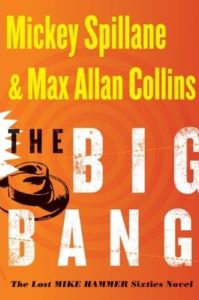
![]() The Big Bang – A Mike Hammer novel written as a collaboration of Mickey Spillane and Max Allan Colllins. It was written / published in 2010 but its set in the late sixties… somewhere between Spillane’s The Body Lovers (1967) and his Survival… Zero! (1970).
The Big Bang – A Mike Hammer novel written as a collaboration of Mickey Spillane and Max Allan Colllins. It was written / published in 2010 but its set in the late sixties… somewhere between Spillane’s The Body Lovers (1967) and his Survival… Zero! (1970).
Now, I don’t know if that’s a run-on sentence and who am I to judge, but I could clearly follow along with what the author was communicating. Mickey Spillane’s Mike Hammer seems all-grown-up.
The story starts out in a fairly typical fashion, our hero coming to the rescue of a stranger; like an urban knight in somewhat shining armor. After saving a hospital bike messenger from three youthful offenders, killing two and hospitalizing the third, Mike soon finds his way fighting an uphill battle against corruption, deception and narcotics in swinging sixties New York. Max Alan Collins weaves this story from a partial manuscript of Spillane’s from the sixties. Its classic Hammer kicking ass and taking no names from a chic village pottery vender shop to a swinging nightclub and a city hospital connection to the drugs trade.
The pacing of the is suspenseful and packed with violence around every corner and sex around every other corner. The action reaches its climax is the antagonist’s lair complete with 60’s style fashion the description of which is worthy of an early Robert B Parker Spenser novel… pure Austin Powers baby. But what really set this novel’s mood, or outlook is the ambiguous ending… Does Mike say something, or is he the urban knight that see’s past the immediate crisis for the future’s possibility? Darkness or the Light?
“She was out of the designer dress as quick as a jump cut in a movie, and although I was trying to swear off those wild oats Velda had said to get sown, I was human – that curvy body with the dramatic tan lines and the puffy, hard-tipped areolas against stark white flesh and the dark pubic triangle against that same startling white was mine for the asking, without asking, and as she began by falling to her knees to worship the part of me that seemed to be in charge.”
